 |
Music and patriotism form a powerful bond.  It's a rare soul who doesn't respond to his or her national anthem with an involuntary lump in the throat, a quickening of the pulse, watering of the eyes or a supportive symbolic gesture, effects so reflexive to suggest an innate connection between musical spur and chauvinistic pride. It's a rare soul who doesn't respond to his or her national anthem with an involuntary lump in the throat, a quickening of the pulse, watering of the eyes or a supportive symbolic gesture, effects so reflexive to suggest an innate connection between musical spur and chauvinistic pride.
Many nationalistic works have been produced over the ages, ranging from the outright descriptive (Ferde Grofé's Grand Canyon Suite, Woody Guthrie's "This Land is Your Land") to the subtly evocative (Isaac Albéniz's Iberia, Paul Simon's "America"). Yet, none packs the impact – at least with its intended audience – of Bedrich Smetana's Má Vlast. ranging from the outright descriptive (Ferde Grofé's Grand Canyon Suite, Woody Guthrie's "This Land is Your Land") to the subtly evocative (Isaac Albéniz's Iberia, Paul Simon's "America"). Yet, none packs the impact – at least with its intended audience – of Bedrich Smetana's Má Vlast.
Smetana came to his patriotic pinnacle only through a circuitous route and a devastating personal crisis. After passing through a half-dozen schools, he dropped out at age 16 to join a quartet. Like his idol Liszt, he first struggled to establish and sustain careers as a traveling piano virtuoso and revered teacher. Although born and raised in Bohemia, he felt unappreciated in his native Prague and in his early thirties he left for a teaching and performing position in Göteborg, Sweden. It was during his five-years there that he became transformed and inspired by powerful feelings toward the country he had left behind. 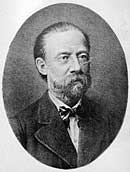 He sublimated his intense homesickness to learn to write in Czech (having been taught in German, as was customary among the educated classes in Prague), produced several orchestral pieces based on historical legend (encouraged by and modeled after Liszt) and became an ardent proselytizer for his country's culture. He sublimated his intense homesickness to learn to write in Czech (having been taught in German, as was customary among the educated classes in Prague), produced several orchestral pieces based on historical legend (encouraged by and modeled after Liszt) and became an ardent proselytizer for his country's culture.
Feeling stifled by the provincialism of Göteborg, he returned home when a new National Theatre opened in Prague, to be devoted to Czech opera. Riding the tide of nationalism that was exploding all over Europe, Smetana plunged himself into the cultural revival of Bohemia. As we know from his copious correspondence, compiled by František Bartoš in Bedrich Smetana – Letters and Reminiscences (Artia 1955), Smetana felt that "if we are gifted, it is our duty to work for the glory of our country." He founded a school and a musicians union and soon became known as his nation's foremost critic, pianist, conductor and, above all, composer.
His second opera, Prodana Nevesta (The Bartered Bride) was hailed as a turning point in Czech history, not only acclaimed at home as founding a novel yet genuine Czech musical style but the first Czech work to enter the international repertoire – a cultural emissary that fulfilled Smetana's goal of proving that his countrymen were not merely proficient performers but endowed with a unique creative force. Its appeal lay well beyond its charming tale of young lovers thwarting an arranged marriage; from the first downbeat of its scintillating overture, it bursts with characteristic dances and folk-tinged (but original) melody. As commentator Milton Cross noted, it's "a rich slice of Bohemian village life, with an ingratiating, ingenuous quality of a folk tale, the entire score seeming to spring from the very bosom of his country."
But Smetana's glory was not to last. In 1874 fate (actually, syphilis) struck the cruelest blow of all for a man of music. In late July during a duck hunting expedition he had felt dizzy and his right ear began to fail. As he later recalled, he returned home one night from the opera, improvised for about an hour at the piano, went to bed and awoke the next morning entirely deaf, never again to hear a single real sound. Not only was his affliction permanent, but it tortured him with a constant roaring ("like a mighty waterfall") and horrible dissonance ("wild cacophony," "shrieking demons in a furious rage"). But Smetana was a man of music, not of words, and in 1876 he provided a frighteningly vivid depiction of his ordeal in the finale of an autobiographical String Quartet, which he entitled "From My Life." 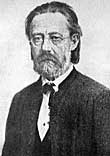 As explained in a letter to his friend Josef Srb-Debrnov, the joyous opening is intended as an apotheosis of Czech national music and his personal professional success, but then abruptly halts, as a persistent, shrill high E leads to a poignant and bitter plunge into despair, where the work ends. As explained in a letter to his friend Josef Srb-Debrnov, the joyous opening is intended as an apotheosis of Czech national music and his personal professional success, but then abruptly halts, as a persistent, shrill high E leads to a poignant and bitter plunge into despair, where the work ends.
The remaining eight years of Smetana's life were indeed distraught and conflicted. While he was constantly feted as a national hero he became increasingly paranoid and wounded by conservative establishment critics, who seized upon his disability to question whether a deaf composer was any more worthy than a blind painter. Although given a state pension, he protested the amount as consigning him to poverty and felt undervalued, since in return the government claimed all royalties from his work. When his doctors ordered him to rest, he viewed himself as a martyr, barred from all that made life beautiful. Yet, he persisted as well as he could. He gave piano recitals, attended concerts (where, having studied the scores, he was able to infer the music from closely observing the performers) and, inspired by a sense of service to the Czech people, continued to write, including three more complete operas (and sketches for a fourth).
Eventually Smetana behaved erratically, hallucinated conversations with imaginary visitors and ultimately was consigned to a lunatic asylum from which he never emerged. But before succumbing to his demons, Smetana surmounted and transmuted his pain into a work of unparalleled scope and power that perhaps could only have emerged from unfettered imagination set adrift from the bounds of sonic reality. To Marta Ottlová, it was a musical apotheosis of everything dear to Smetana, filled with mythical and historical reminiscences and propelling his emergent nation toward a vision of the future. Louis Biancolli deemed it Smetana's artistic manifesto, a vivid tapestry in which compatriots would treasure their glorious history and envision a still nobler future, and outsiders would understand his land and come to love it, too. Paul Myers agrees: "Although it remains the work of a Bohemian composer, it communicates an international message of pride and love of homeland." Smetana called it, simply, Má Vlast (My Country).
Most composers disdain narrative as demeaning the power of their art. 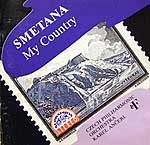 Despite its universality, and although much of the writing is so vivid as to speak for itself, Smetana wanted to be sure his specific intentions were understood and so in 1879 he sent his publisher detailed descriptions to be included in the score. The first two of its six movements were written in a matter of weeks at the very onset of his deafness. "Vyšehrad" is a rocky bluff overlooking Prague, where the Bohemian royal court had flourished in the eighth century under Queen Libuše, a seer whose prophecies of glory for her people Smetana also celebrated in a ceremonial opera. It opens with the unadorned harp of the bard Lumir, intoning a stately four-note motif that conjures past glory even while tinged with regret at the present ruin. The music rises in splendor to evoke a bygone bustle of activity, gleaming armor, war cries and celebrations of victory. Despite its universality, and although much of the writing is so vivid as to speak for itself, Smetana wanted to be sure his specific intentions were understood and so in 1879 he sent his publisher detailed descriptions to be included in the score. The first two of its six movements were written in a matter of weeks at the very onset of his deafness. "Vyšehrad" is a rocky bluff overlooking Prague, where the Bohemian royal court had flourished in the eighth century under Queen Libuše, a seer whose prophecies of glory for her people Smetana also celebrated in a ceremonial opera. It opens with the unadorned harp of the bard Lumir, intoning a stately four-note motif that conjures past glory even while tinged with regret at the present ruin. The music rises in splendor to evoke a bygone bustle of activity, gleaming armor, war cries and celebrations of victory.
The most popular of the six movements, often heard on its own, is "Vlavta" ("The Moldau"),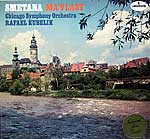 a vivid portrait of Bohemia's mighty river from source to end. Smetana conceived the seminal idea for the opening during an 1867 picnic at the conjunction of the two mountain brooks, which he depicts with flutes and clarinets, each gurgling in constant motion, as pizzicato strings highlight glints of sunlight on the rippling surface trickling over the rocks. The brooks coalesce into a swift stream whose lovely melody may sound familiar, as it's derived from the same folk source as "Hatikva," the Zionist, and now Israeli, national anthem. As the river swells and courses through the countryside, we hear hunting horns, a wedding dance, nocturnal nymphs, foaming rapids and a majestic flow past Prague before disappearing from sight as it joins the sea. a vivid portrait of Bohemia's mighty river from source to end. Smetana conceived the seminal idea for the opening during an 1867 picnic at the conjunction of the two mountain brooks, which he depicts with flutes and clarinets, each gurgling in constant motion, as pizzicato strings highlight glints of sunlight on the rippling surface trickling over the rocks. The brooks coalesce into a swift stream whose lovely melody may sound familiar, as it's derived from the same folk source as "Hatikva," the Zionist, and now Israeli, national anthem. As the river swells and courses through the countryside, we hear hunting horns, a wedding dance, nocturnal nymphs, foaming rapids and a majestic flow past Prague before disappearing from sight as it joins the sea.
Having depicted history and the land, Smetana next turned to legend.  "Šŕrka" is the bloody tale of an Amazon maiden who massacres the men who betrayed her. It begins in blind rage, mellows as she seduces her unfaithful lover and lulls his soldiers to sleep and then snarls with fierce pride as she calls her troops to avenge her shame. After such violence, "Z cesýkch luhu a háju" ("From Bohemia's Meadows and Fields") is a pastoral interlude, a celebration of the splendor of Nature amid the scents and breezes of a summer day. Yet, the spirit of the people is ever-present, as snatches of songs and dances drift across the open countryside. Inspired by the infectious mood, the composer gets a bit giddy, tossing in a fugue and many false starts in different keys, the only touch of humor in the otherwise purposeful and thickly-orchestrated score. "Šŕrka" is the bloody tale of an Amazon maiden who massacres the men who betrayed her. It begins in blind rage, mellows as she seduces her unfaithful lover and lulls his soldiers to sleep and then snarls with fierce pride as she calls her troops to avenge her shame. After such violence, "Z cesýkch luhu a háju" ("From Bohemia's Meadows and Fields") is a pastoral interlude, a celebration of the splendor of Nature amid the scents and breezes of a summer day. Yet, the spirit of the people is ever-present, as snatches of songs and dances drift across the open countryside. Inspired by the infectious mood, the composer gets a bit giddy, tossing in a fugue and many false starts in different keys, the only touch of humor in the otherwise purposeful and thickly-orchestrated score.
After a break of four years Smetana returned to complete Má Vlast with a pair of related pieces. "Tábor" is a character portrait of Hussite warriors, fourteenth century religious zealot dissidents who founded a stronghold and defended it to the death. Their faith is symbolized with their hymn tune, robust, imposing and steadfast, that arises from the mists of time,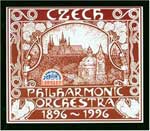 infuses their fervent prayers, grim preparations for battle and tense uncertainty of their fate, and ultimately mourns their ultimate defeat. "Blaník" is the mountain where the warriors sleep until the day when they might again be summoned to rally and defend their people in time of need. The piece begins with the same defiant motif that ends "Tábor," but then, just as the land itself is now used as pasture, the theme is figuratively covered by a shepherd's idyll. Yet, underlying tension remains and surfaces with nervous vigor; in response to the people's suffering, the knights emerge with a new joyous hymn to triumph and restore peace. An apotheosis, guaranteed to bring any Czech audience (and most others) to its feet, begins as the Hussite hymns blaze with unfettered confidence and vigor, capped by the opening harp motif thundering out, as if the poet, gripped by Smetana's review of the history, character, land, pride and aspirations of the entire Czech people, beams with resounding approval. The work concludes with a brief, vibrant march, pointing the nation toward the glorious future Queen Libuše had foretold at the first flowering of its culture. infuses their fervent prayers, grim preparations for battle and tense uncertainty of their fate, and ultimately mourns their ultimate defeat. "Blaník" is the mountain where the warriors sleep until the day when they might again be summoned to rally and defend their people in time of need. The piece begins with the same defiant motif that ends "Tábor," but then, just as the land itself is now used as pasture, the theme is figuratively covered by a shepherd's idyll. Yet, underlying tension remains and surfaces with nervous vigor; in response to the people's suffering, the knights emerge with a new joyous hymn to triumph and restore peace. An apotheosis, guaranteed to bring any Czech audience (and most others) to its feet, begins as the Hussite hymns blaze with unfettered confidence and vigor, capped by the opening harp motif thundering out, as if the poet, gripped by Smetana's review of the history, character, land, pride and aspirations of the entire Czech people, beams with resounding approval. The work concludes with a brief, vibrant march, pointing the nation toward the glorious future Queen Libuše had foretold at the first flowering of its culture.
Following completion, each piece was eagerly welcomed and enthusiastically celebrated at individual premieres.  The complete Má Vlast received its debut on November 5, 1882 before an ecstatic audience – and its composer, who couldn't hear a single note. Given its symbolic importance in the annals of Czech nationalism, the full cycle, although rarely performed abroad, is an imperative for Czech conductors and ensembles and has been recorded by them dozens of times. Indeed, while others have produced patient and detailed readings, they lack the special stamp of authenticity of Czech musicians, for whom a performance of Má Vlast is an event of great import or, as David Hurwitz noted, more than a cute series of Czech postcards, but rather "uncomfortable" music about important life and death issues. An astonishing souvenir of the cycle's patriotic resonance survives in a deeply moving June 5, 1939 broadcast by the Czech Philharmonic under Vaclav Talich at the National Theatre, in the heart of Nazi-occupied Prague, in which the audience not only follows each movement with an ecstatic minute-long shouting ovation, but breaks into a communal outburst of the Czech national anthem at the end. The complete Má Vlast received its debut on November 5, 1882 before an ecstatic audience – and its composer, who couldn't hear a single note. Given its symbolic importance in the annals of Czech nationalism, the full cycle, although rarely performed abroad, is an imperative for Czech conductors and ensembles and has been recorded by them dozens of times. Indeed, while others have produced patient and detailed readings, they lack the special stamp of authenticity of Czech musicians, for whom a performance of Má Vlast is an event of great import or, as David Hurwitz noted, more than a cute series of Czech postcards, but rather "uncomfortable" music about important life and death issues. An astonishing souvenir of the cycle's patriotic resonance survives in a deeply moving June 5, 1939 broadcast by the Czech Philharmonic under Vaclav Talich at the National Theatre, in the heart of Nazi-occupied Prague, in which the audience not only follows each movement with an ecstatic minute-long shouting ovation, but breaks into a communal outburst of the Czech national anthem at the end.
While Stokowski, Toscanini, Szell and others cut fine recordings of "The Moldau," the full cycle exerts a far more potent spell. 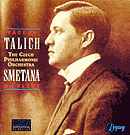 The earliest to appear was a 1929 set of ten 78s led by Talich (now on Koch CD 7032), which unfolds with patient, reverential respect, as though it would be blasphemy to desecrate the composer's holy text with personal thoughts, and the early electric process ably captures the distinctively rich, blended sound of the Czech Philharmonic Orchestra (founded by Dvorak, the inheritor of Smetana's mantle, in 1896). Whether Talich established or reflected a cultural norm, nearly all the Czech conductors who followed him into the studio reflect a similar style, including Ancerl, Belohlávek, Kosler, Neumann, Pešek, Šenja and Smetácek, all leading the Czech Philharmonic. And for those to whom "Bohemian" suggests the colloquial meaning of endearing eccentricity, Igor and Renata Ardašev (Czech husband and wife) bring Smetana's own four-hand piano arrangement to life on Supraphon 3712, gaining in intimacy for the loss of full orchestral texture (and, as the notes by Vlata Reittererová remind us, may be how Smetana, a consummate pianist, "heard" and conceived the work in the first place). The earliest to appear was a 1929 set of ten 78s led by Talich (now on Koch CD 7032), which unfolds with patient, reverential respect, as though it would be blasphemy to desecrate the composer's holy text with personal thoughts, and the early electric process ably captures the distinctively rich, blended sound of the Czech Philharmonic Orchestra (founded by Dvorak, the inheritor of Smetana's mantle, in 1896). Whether Talich established or reflected a cultural norm, nearly all the Czech conductors who followed him into the studio reflect a similar style, including Ancerl, Belohlávek, Kosler, Neumann, Pešek, Šenja and Smetácek, all leading the Czech Philharmonic. And for those to whom "Bohemian" suggests the colloquial meaning of endearing eccentricity, Igor and Renata Ardašev (Czech husband and wife) bring Smetana's own four-hand piano arrangement to life on Supraphon 3712, gaining in intimacy for the loss of full orchestral texture (and, as the notes by Vlata Reittererová remind us, may be how Smetana, a consummate pianist, "heard" and conceived the work in the first place).
Of other available recordings, two break with tradition for a different course. 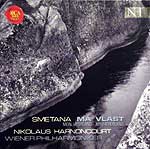 Roger Norrington and the London Classical Players (Virgin 545301) attempted in 1996 to recreate a performance of Smetana's own time. According to Norrington's notes, he eschewed published editions (and their editorial "improvements") for the original manuscript, rebalanced the orchestra by lessening the prominence of strings (and muting their tone with gut strings), and returned to playing techniques of the era (including minimal vibrato). The result is a softer, more gracious reading, full of lyrical grace and boasting a transparent sonority that highlights abstract beauty and the instrumental interplay. Nikolas Harnoncourt and the Vienna Philharmonic (RCA 54331) similarly strip their 2001 recording of rhetoric. The Vienna Philharmonic invests the score with their silken sheen, and the unusually slow tempos are offset by lightened textures that manage to escape a feeling of being labored. Yet, both versions seem somewhat mechanical, drained of passion and ultimately rather detached. (James Levine's earlier 1986 reading with the Vienna Philharmonic (DG) is more animated and emotionally fulfilling.) Roger Norrington and the London Classical Players (Virgin 545301) attempted in 1996 to recreate a performance of Smetana's own time. According to Norrington's notes, he eschewed published editions (and their editorial "improvements") for the original manuscript, rebalanced the orchestra by lessening the prominence of strings (and muting their tone with gut strings), and returned to playing techniques of the era (including minimal vibrato). The result is a softer, more gracious reading, full of lyrical grace and boasting a transparent sonority that highlights abstract beauty and the instrumental interplay. Nikolas Harnoncourt and the Vienna Philharmonic (RCA 54331) similarly strip their 2001 recording of rhetoric. The Vienna Philharmonic invests the score with their silken sheen, and the unusually slow tempos are offset by lightened textures that manage to escape a feeling of being labored. Yet, both versions seem somewhat mechanical, drained of passion and ultimately rather detached. (James Levine's earlier 1986 reading with the Vienna Philharmonic (DG) is more animated and emotionally fulfilling.)
Strikingly emphatic dynamic accents in a 1943 set by Otakar Jeremias and the Prague Radio Symphony (Lys 137), possibly kindled by wartime patriotic fervor, heralded a more proactive, yet probably equally authentic, model that may have inspired my two favorite readings, both by Rafael Kubelík. Son of a famed violinist, successor to Talich as head of the Czech Philharmonic, and a paradigm of integrity for Czech artistic life during Nazi occupation, Kubelík's musical and patriotic credentials were secure. Indeed, he cut a delightfully fluent "Moldau" with the Czech Philharmonic in 1937 (Lys 050). But, deeply principled, he could not abide Communist constraint and left Czechoslovakia after the 1948 coup to spend the remainder of his career in exile. As he put it, "A caged bird cannot sing. I left my country but I did not leave my nation. My nation was in my heart all the time." Reveling in a freedom denied his homeland, he fervently advocated Czech music throughout the world by infusing its great orchestras with Slavic spirit. yet probably equally authentic, model that may have inspired my two favorite readings, both by Rafael Kubelík. Son of a famed violinist, successor to Talich as head of the Czech Philharmonic, and a paradigm of integrity for Czech artistic life during Nazi occupation, Kubelík's musical and patriotic credentials were secure. Indeed, he cut a delightfully fluent "Moldau" with the Czech Philharmonic in 1937 (Lys 050). But, deeply principled, he could not abide Communist constraint and left Czechoslovakia after the 1948 coup to spend the remainder of his career in exile. As he put it, "A caged bird cannot sing. I left my country but I did not leave my nation. My nation was in my heart all the time." Reveling in a freedom denied his homeland, he fervently advocated Czech music throughout the world by infusing its great orchestras with Slavic spirit.  He joined many fellow compatriot refugees in the Chicago Symphony in 1952 to deliver the most fervent of all recorded Má Vlasts, bursting with ecstatic passion and vitality and captured in superb detail (but heavy overload distortion) by Mercury's single microphone "Living Presence" technique (now on Mercury 434 379). In a 1970 stereo remake, he ignited the often tepid Boston Symphony to unaccustomed heat (DG 29183). At long last, once the "velvet revolution" ended Communist rule, Kubelík emerged from years of illness and retirement to return home and open the 1990 Prague Festival with, of course, Má Vlast (Supraphon 1208). It's a striking performance, rife with poignant symbolism – reunited for the first time in 42 years, the Czech Philharmonic plays for its former leader with breathtaking focus, transcendent eloquence and a palpable aura of deep, abiding love that channels and conveys the intense emotions Smetana himself must have felt in transforming his maddening prisons of silence and din into a torrent of fervor for his country and his people. He joined many fellow compatriot refugees in the Chicago Symphony in 1952 to deliver the most fervent of all recorded Má Vlasts, bursting with ecstatic passion and vitality and captured in superb detail (but heavy overload distortion) by Mercury's single microphone "Living Presence" technique (now on Mercury 434 379). In a 1970 stereo remake, he ignited the often tepid Boston Symphony to unaccustomed heat (DG 29183). At long last, once the "velvet revolution" ended Communist rule, Kubelík emerged from years of illness and retirement to return home and open the 1990 Prague Festival with, of course, Má Vlast (Supraphon 1208). It's a striking performance, rife with poignant symbolism – reunited for the first time in 42 years, the Czech Philharmonic plays for its former leader with breathtaking focus, transcendent eloquence and a palpable aura of deep, abiding love that channels and conveys the intense emotions Smetana himself must have felt in transforming his maddening prisons of silence and din into a torrent of fervor for his country and his people.

Copyright 2004 by Peter Gutmann
|
